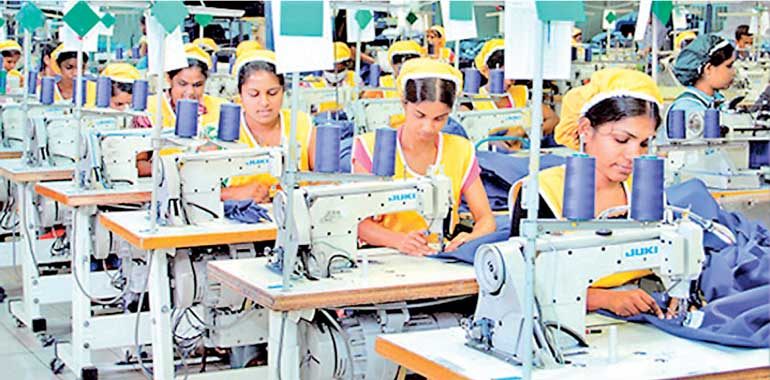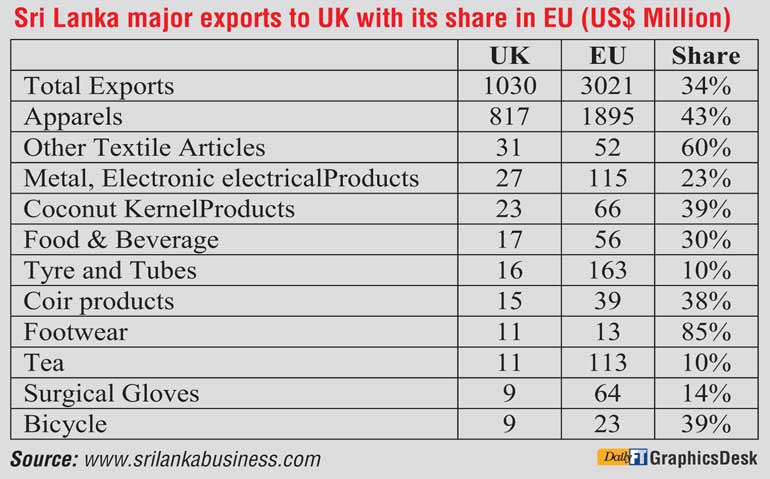Wednesday Feb 25, 2026
Wednesday Feb 25, 2026
Wednesday, 29 June 2016 00:00 - - {{hitsCtrl.values.hits}}

With the withdrawal of the UK from the EU, it is likely to gain benefits and bear losses as well in social, political and economic sectors internationally. The most important factor with regard to Sri Lanka is how such changes could affect Sri Lanka exports as our key export destination

 A popular topic within the international community during the last few months was on the withdrawal of the United Kingdom (UK) from the European Union (EU), campaigned as Brexit. After having a long dialogue on this issue, a Referendum was held on 23 June in a bid to test the will of the British people either to remain or exit the European Union. As a result, British people have now voiced their final decision with 52% to 48% to quit the EU.
A popular topic within the international community during the last few months was on the withdrawal of the United Kingdom (UK) from the European Union (EU), campaigned as Brexit. After having a long dialogue on this issue, a Referendum was held on 23 June in a bid to test the will of the British people either to remain or exit the European Union. As a result, British people have now voiced their final decision with 52% to 48% to quit the EU.
With the withdrawal of the UK from the EU, it is likely to gain benefits and bear losses as well in social, political and economic sectors internationally. The most important factor with regard to Sri Lanka is how such changes could affect Sri Lanka exports as our key export destination.
Western Europe after the Second World War, a battle mainly among European countries, realised that it was the war that caused most damages to their nations. Obviously the European nations have been rivals against one another in an attempt to achieve economic and political leadership. Their dominating objectives brought down their own economy and political prowess to a trying condition losing their colonies and pride maintained for the past centuries.
Social and political leadership in Europe at the time believed that the best way to overcome difficult issues and brave new  challenges and rebuild the image was to emerge all European nations as one united country with the idea of open Europe to all Europeans. European politicians like Robert Schuman and Jean Monnet who played a major role in founding a united Europe might not have expected the present achievement of EU as the most powerful regional group.
challenges and rebuild the image was to emerge all European nations as one united country with the idea of open Europe to all Europeans. European politicians like Robert Schuman and Jean Monnet who played a major role in founding a united Europe might not have expected the present achievement of EU as the most powerful regional group.
After having a long dialogue on the creation of United Europe, in 1951 six Western nations unanimously formed the European Coal and Steel Community (ECSC) signing the Treaty of Paris on the issue of purchase and use of steel and coal to create common market for steel and coal as important resources available in Europe.
The success of the ECSC then encouraged the leaders who favoured a united Europe to establish the European Economic Commission (EEC) in 1958 as common market for all the products with the famous Treaty of Rome signed by the same six nations. The results of this common market concept were the establishment of custom union having common tariff system, common trade rules and regulations to all EEC member nations.
Subsequently this organisation became the European Community (EC) then developed to a signal market as an area without frontiers in which the free movement of goods and persons, services, capital, one currency and one political frame, etc. Finally the European Union (EU) was formed in 1993.
In the 21st century the EU was cited as the most powerful regional integration as a proper organising body with 28 powerful Western countries. It has its own parliament, common currency, free movement of trade, etc. Even if it was created with economic objectives, it later became a great success and united Europe politically, economically and socially. Although growth has been projected to be slow in the last few years, the EU remains the largest economy in the world with a GDP per head of €25 000 for its 500 million consumers. The EU is the world’s largest trading block with $ 12,125 billion trade (2014). EU was introduced by certain economists as a perfect model for regional integration.
Sudden change
With Brexit, it creates sudden change in global political and economic sectors. As a developing nation it is vitally important to review the issue as to how this new trend affects Sri Lanka’s exports.
The United Kingdom has been playing an excellent role in shaping Sri Lanka’s economy in terms of export trade. Since Independence, UK has been at the apex in trade as Sri Lanka’s export destination and continues to maintain its cooperation with the colonial connection UK had with Sri Lanka.
In a few decades the UK has become the second highest export destination with $ 1,031 million in 2015 after SL exports to USA of $ 2,803 million. Sri Lanka’s third, fourth and fifth export destinations India ($ 645 m), Germany ($ 475 m), Italy ($ 434 m) respectively are significantly lower than exports to the UK.
Sri Lanka exports nearly $ 3,000 million worth of goods to the EU and approximately 34% of those exports goes to the UK. Even though the other members of EU are equally strong economically, their purchase from Sri Lanka is less than what is purchased by UK.
While UK contributes 34% of Sri Lanka exports to the EU, mainly Germany, Italy, Belgium, France and Holland share Sri Lanka exports $ 475 million (16%), $ 434 m (14%), $ 283 m (9%), $ 220 m (7%), $ 192 m (6%) respectively. The remaining 13% of Sri Lanka’s exports to the EU is distributed among the other 22 member nations.
As far as export products to the EU is concerned, the UK become a major player in the most product sectors. Approximately, half of the apparel exports to the EU are shared by the UK. Today Sri Lanka exports more than 40 products to the EU with significant quantities and it mainly goes to the UK.
As a result of the exit of the UK, it is feared that Sri Lanka could be adversely affected on its trade especially with possibility of losing GSP facility.
GSP
A review of Sri Lankan exports indicates that out of all products exported during the last 25 years, the apparel sector has taken the lead in 45% of total products exported. The most significant feature is that the US and EU equally share 43% of the exports, making the total 86% of Sri Lanka’s apparel export.
Even though the US offers GSP facilities with special features like duty zero facility for beneficiary products list, the textiles, apparel, footwear, etc. are not included in their GSP product list. This reveals that even apparel, Sri Lanka’s biggest export product which covers 70% total exports to the US, is not included in its GSP facility.
As members of one Union, GSP Plus is offered to encourage a wider range of products to be purchased by the EU. Most of Sri Lankan leading export products like apparel, footwear, tuna, other seafood, ornamental fish, some varieties of cut flowers and foliage, black tea, gherkins, rubber items, activated carbon, tableware and wooden products are included among the 7,500 products eligible for EU GSP. Currently, Sri Lanka exports under standard GSP with reduced tariff but not totally duty free which eligible under GSP Plus. Exports to an approximate value of $ 2.5 billion under EU GSP could be executed which represents 25% of total Sri Lankan exports to the world.
Sri Lanka is a beneficiary country under standard GSP and is eligible to exports to the EU 20% less than the MFN tariff rates of the EU.
With the exit of the UK, Sri Lanka may lose the tariff concessions under GSP for the bulk of its products the o Western market and has to compete with other suppliers from the entire world. The same result would be affected for other competitors.
On the other hand Sri Lanka’s competitors mainly for apparel like Bangladesh, Cambodia, Afghanistan and Pakistan which are presently enjoying Duty Zero facilities under special GSP schemes, namely the Everything But Arms (EBA) scheme and GSP Plus, will be required to compete with other suppliers from developing and developed countries on a common tariff structure within the UK market introduced by UK.
On the other hand, Sri Lankan exports to the UK for the last 40 years were affected under common rules and regulations stipulated by the EU. As a member of a custom union, the UK offered a common tariff that was approved by the EU. It is too early to predict what kind of tariff structure will be introduced by the UK as a non-member of the EU for future trade.
GSP Plus, a special incentive arrangement, was introduced by the EU in 2005 under EU GSP offering facilities to selected beneficiary countries including Sri Lanka to import products approved by the EU to the European Union totally import duty zero. It was in December 2009 that the EU decided to withdraw temporarily the GSP Plus benefits to Sri Lanka due to non-fulfilment of the requirements.
Difficult situation
The new Government has focused its immediate attention of building a conducive environment by policy changes in the country in an attempt to convince the European Union to grant GSP Plus benefits temporarily suspended in early 2010. The Government had high hopes that they could obtain GSP Plus back to Sri Lanka with the relationship they developed with the West. But it creates another difficulty to Sri Lanka with Brexit on the negotiation on GSP Plus. The UK was the best conveyor to interpret our views to the EU with a strong relationship as a member of the Commonwealth.
The significant factor is that this issue needs deep consideration of the future. The truth should be acknowledged sans narrow minded views that Sri Lanka is confronting a very difficult situation with regard to its exports. No significant increase of Sri Lanka exports during the last five years has emerged and exports have been stagnating at $ 10 billion.
Brexit has made the situation more difficult as it appears. In addition, more than 50% depends on Sri Lanka’s exports to the USA and EU. It will take a long time to find new markets around the globe even though there is hope that it may be possible in the near future. What is more important is to consider a short-term strategy rather than a long-term one.
It could be assured that the UK will negotiate Free Trade Agreements with the EU through its commanding record of a reputable partner in trade for the last few years. In the last two decades two-third of total UK exports of goods were purchased by the EU and the UK covers three-quarters of its total imports from goods imported from the EU.
There is every possibility that the UK will introduce a preferential tariff system or GSP as an individual country because almost all Western countries operate schemes of similar status but nobody can predict what the final choice of the UK will be.
It is suggested that Sri Lanka should take immediate measures to initiate negotiations on a Free Trade Agreement as the UK and Sri Lanka have been maintaining a strong relationship for decades. The onus of the Sri Lanka Government is to give top priority to earliest discussions. Mostly on trade, it has been the practice in Sri Lanka to have negotiations mainly with Asian countries, doubtful of profitable gains. Obviously, Sri Lanka could easily initiate a favourable trade agreement with the present trend of trade with the UK. It displays that in terms of trade balance between Sri Lanka and the UK, it is continuously operated in favour of Sri Lanka with $ 486 million imports from the UK while Sri Lanka exports $ 1,031 m to the UK.
Take leadership
At this crucial moment, developing nations of the Commonwealth may opt to request the UK to introduce a preferential tariff system to Commonwealth countries. Sri Lanka could take the leadership on basic negotiations for a Commonwealth preferential tariff system. Canada presently operates a preferential tariff system called Commonwealth Caribbean Countries Tariff (CCCT) to offer tariff concessions to agricultural products of Commonwealth Caribbean countries. The above proposal may come to light shortly and it is liable to help all Commonwealth countries to trade with the UK.
There is a National Advisory Committee of Exporters set up by SLEDB in line up with the EDB Act. It is understood that this advisory committee met eventually in 2004 or 2005 at the most difficult period of exports. The immediate attention of the President or Prime Minister is requested to have a discussion with this National Advisory Committee and the business community, motivating them to reach a short-term strategy in an attempt to resolve the issue. South Korea followed a step of this nature in the early 1980s. It is a necessity at this moment to begin a close dialogue with the business community monitoring these changes.
Finally, the European Union is based on the rule of law. This means that every action taken by the EU is founded on treaties that have been approved by all EU countries. There are eight main treaties including a treaty called the Lisbon Treaty. According to Article 50 of the Lisbon Treaty, the most appropriate part of the treaty regarding Brexit indicates that a Member State would notify the EU of its intention to exit the Union and a withdrawal agreement would be negotiated. It further indicates that the treaties of the European Union would cease to be applicable to that State from the date of the agreement or, failing that, within two years of the notification unless the Council, in agreement with the State, unanimously decides to extend this period. Sri Lanka has sufficient time of two years to negotiate its proposals.
In conclusion, it is vital to point out that a crisis of the financial market in UK has emerged with Brexit creating an economic downfall on the sudden change. Sri Lanka was fortunate to continue exporting apparel products to the EU market during the last few years despite duty zero facility being enjoyed by certain other nations. The continuation of supply of Sri Lankan products to upper and upper middle class market segments with high value and continuous value addition resulted in a commanding success of business. Apparently the fall of the Sterling Pound and economic crisis in the UK may possibly change the lifestyle of the actors of the above segments. It is predicted that this situation might affect not only apparel exports but also the supply base of other sectors as well.
(The writer is the retired former Head of Corporate Affairs and Communications – Sri Lanka Export Development Board and ex-Director of the Sri Lanka Trade Centre in the Maldives. He can be reached at [email protected].)